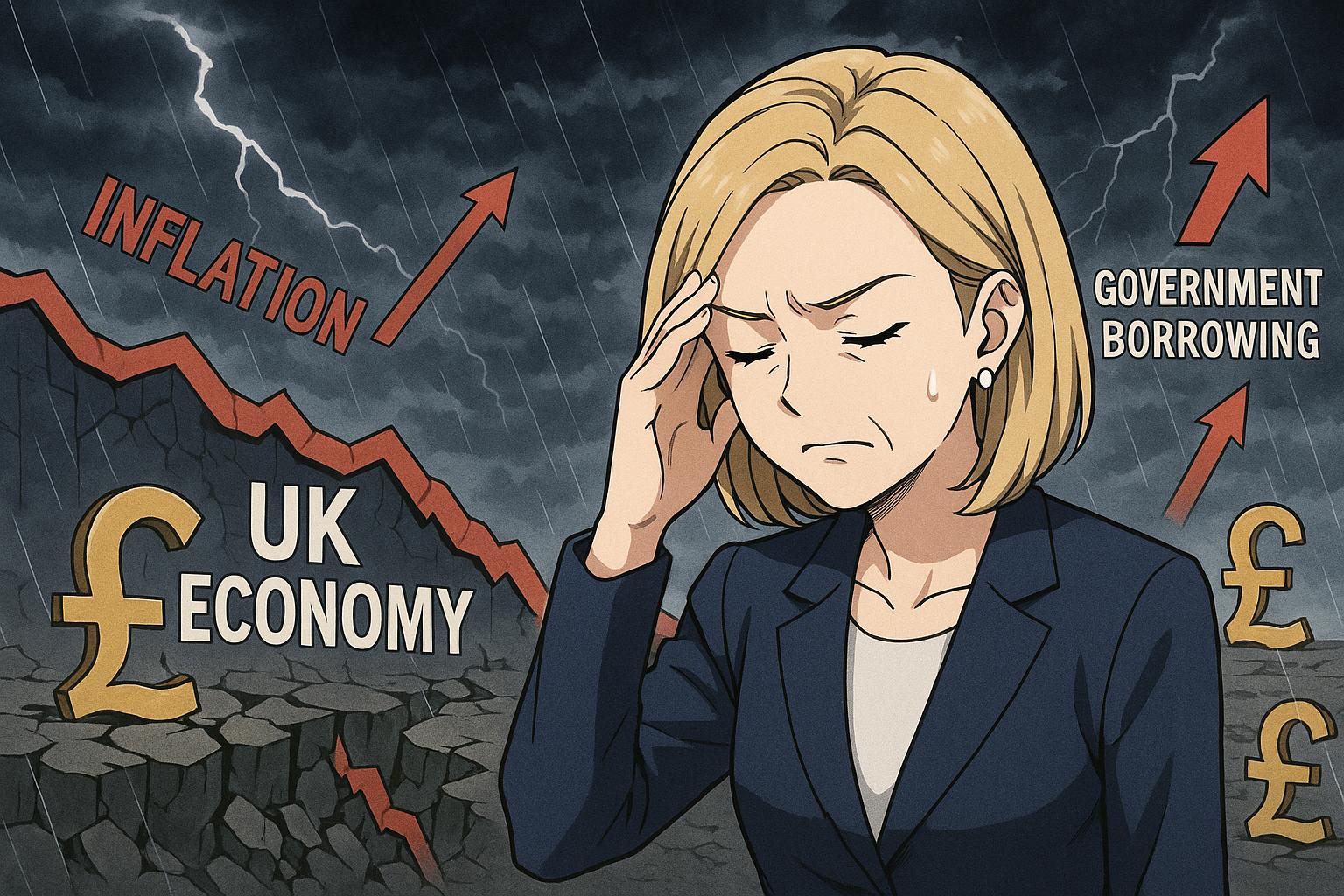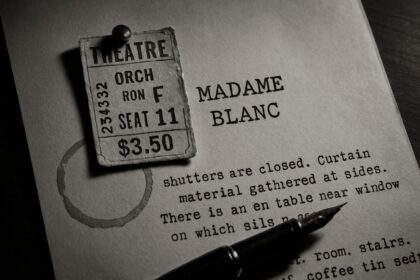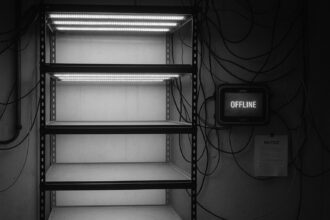Despite Labour’s assertions of stabilising public finances, UK inflation hits 3.5% and borrowing spikes to record April levels, exacerbated by costly public-sector pay rises and looming tax hikes that deepen economic instability and party divisions ahead of the general election.
As the Chancellor luxuriates at the Rimrock Resort Hotel in Canada during the G7 finance ministers’ meeting, serious concerns are escalating at home regarding the true state of the UK’s economy. Rachel Reeves’s claims of having stabilised public finances are increasingly at odds with the stark reality, highlighted by a troubling inflation rise to 3.5% and an alarming spike in government borrowing that reached £20.2 billion in April—the highest for that month since records began in 1993.
The government’s announcement regarding inflation-busting pay increases of up to 4.5% for select public-sector workers only exacerbates the situation. This decision comes at a time when the economy is already struggling, having been battered by substantial tax increases totalling £40 billion in last year’s budget, impacting both consumers and businesses.
The Prime Minister, Sir Keir Starmer, has publicly chastised Reeves by reinstating the winter fuel allowance, a move she scrapped, which will add £1.4 billion to an already strained treasury. This glaring contradiction reflects a government out of touch, recklessly spending while running substantial deficits—spending millions more than it collects in tax each month.
Although there was a reported 0.7% economic growth in the first quarter of this year following a stagnant second half of 2024, the prospects appear grim. This growth could quickly evaporate due to escalating geopolitical tensions that impact inflation. The Bank of England’s chief economist, Huw Pill, recently warned that the path to controlling inflation will be long, signalling that hopes for swift interest rate cuts were misconceived. With rates currently at 4.25%, there looms a significant threat of further hikes.
Reeves may blame international market conditions for rising gilt yields, indicative of waning confidence among bond markets, but many of the current woes seem self-inflicted. The government’s strategy to achieve industrial peace through hefty pay settlements—without linking them to productivity—has begun to backfire. The Institute for Fiscal Studies has cautioned that the newly announced pay rises for NHS staff and teachers will necessitate cuts elsewhere, further deepening the existing tax burden.
Reeves’s attempts to maintain fiscal balance while facilitating borrowing for “investment” appear increasingly unrealistic in the face of a burgeoning fiscal crisis. The reported £10 billion headroom now looks more like an illusion, as signs point to a tax-increasing budget later this year. This raises the spectre of a return to the Labour Party’s historical pattern of unchecked spending, which often results in economic turmoil.
This dilemma is made worse by the urgent need for increased defence spending in light of rising global threats and the obligation to enhance national security. The introduction of eight new proposed taxes on the wealthy, as revealed in a leaked memo from Deputy Prime Minister Angela Rayner, highlights a growing rift within Labour, as pressure mounts from the party’s left wing.
With slow economic growth and national debt surpassing 100% of GDP, the UK faces a precarious path reminiscent of Greece’s economic collapse around 2011. Record-high bond rates—now worse than those during Liz Truss’s ill-fated premiership—illustrate a rising tide of investor scepticism about the government’s fiscal prudence.
The government’s failure to foster sustainable growth, coupled with missed opportunities such as the vaccine manufacturing plant on the Wirral, underscores the UK’s dire need to attract investment amidst intensifying global competition, particularly from the US.
The once-confident Chancellor now finds herself mired in scepticism regarding her ability to navigate this financial storm. The Labour Party’s traditional proclivity for taxing and spending remains a dark cloud looming over its future governance. As the economic landscape becomes increasingly hostile, Reeves’s position hangs precariously, risking further public discontent and crippling economic instability ahead of the next general election.
Source: Noah Wire Services
- https://www.dailymail.co.uk/debate/article-14741409/Reeves-fixed-economic-foundations-shes-presiding-looming-disaster-bad-Greece-writes-ALEX-BRUMMER.html?ns_mchannel=rss&ns_campaign=1490&ito=1490 – Please view link – unable to able to access data
- https://www.ft.com/content/5d07cfbb-f529-4eec-9b26-5a48f70c1fae – In this article, Rachel Reeves, the UK’s shadow chancellor, accuses Prime Minister Rishi Sunak of misleading the public about the state of the economy. Despite expectations of economic growth and reduced inflation in early 2024, Reeves argues that the public does not feel better off, dismissing positive data as insufficient. She emphasizes Labour’s commitment to business certainty and state-funded green technology investments, promising responsible governance and stability.
- https://apnews.com/article/7ab39d5ce6096414f524f762ab659562 – The Bank of England has maintained the UK interest rate at 5.25%, the highest in 15 years, while warning of potential increases in borrowing costs if oil and gas prices spike due to geopolitical tensions, specifically the Israel-Hamas conflict. Despite predicting a significant drop in inflation, which was 6.7% in September, the bank anticipates it will not meet the 2% target until late 2025. Some committee members proposed a further rate hike to combat inflation. The bank, along with the US Federal Reserve and the European Central Bank, has recently paused rate hikes amid efforts to curb inflation driven by COVID-19 disruptions and the Ukraine war. Higher interest rates are cooling the economy, impacting homeowners with expiring low-rate mortgages, and creating an economically challenging environment ahead of the 2025 general elections. The treasury’s upcoming budget aims to stimulate growth through private investment.
- https://www.reuters.com/world/uk/uks-labour-keep-fiscal-rule-debt-burden-reports-say-2024-03-19/ – The UK’s opposition Labour Party, poised to potentially win the next election, unveiled new fiscal rules aimed at revitalizing the stagnant economy while allowing for more public investment. Rachel Reeves, Labour’s finance policy chief, outlined that the future Labour government would ensure the current budget is balanced and that debt levels decrease as a share of the economy by the fifth year of forecasts. This framework would permit borrowing for investment to stimulate growth. The speech, delivered at a business school in London, emphasized maintaining the Bank of England’s 2% inflation target and safeguarding its independence. Britain’s economy faces challenges including high inflation and elevated tax levels post-COVID and amid the Ukraine conflict. Labour, leading in opinion polls, contrasts with Prime Minister Rishi Sunak’s Conservatives, who advocate for prudent fiscal management. Reeves also proposed assessing the long-term impacts of government investments and adopting a different approach to economic management to ensure widely shared growth benefits and mitigate political instability.
- https://www.reuters.com/world/uk/uks-reeves-working-get-budget-goals-back-track-2025-03-05/ – British finance minister Rachel Reeves is attempting to meet her budget goals amid expected spending cuts and fiscal challenges. In her Spring Statement set for March 26, she is anticipated to address the gap revealed by the Office for Budget Responsibility, which indicates difficulty in balancing public spending with tax revenues by the decade’s end. Reeves’ October budget increased employer taxes and borrowing, with plans for future updates. However, lower-than-expected economic growth and global inflation concerns following Donald Trump’s U.S. presidency have strained her fiscal margin. Options include immediate and future spending cuts, particularly in welfare and departmental budgets, potentially totaling billions. Tax increases might also be considered, such as extending the freeze on income tax thresholds. Longer-term risks include possible downward revisions of the UK’s growth forecasts, necessitating further tough fiscal decisions. Reeves aims to reassure investors while managing Prime Minister Keir Starmer’s Labour government’s economic credibility.
- https://www.ft.com/content/901894ad-7a07-4002-a413-98fb490742d0 – In November, the UK economy grew by a modest 0.1%, falling short of the 0.2% growth forecast and following two consecutive months of economic contraction. This has intensified the pressure on Chancellor Rachel Reeves to restore confidence in the government’s economic strategies. The minor growth has not alleviated stagflation concerns, characterized by slow growth and persistent inflation, which had previously driven up borrowing costs. However, recent reductions in gilt yields suggest anticipation of further interest rate cuts by the Bank of England. Despite Labour’s promise for economic growth, Reeves’ October Budget faced criticism for imposing significant tax increases on businesses. The services sector drove the minimal growth, while manufacturing contracted, and construction saw slight improvements. Economic stagnation remains a concern, with no quarter-over-quarter growth recorded in recent months, contrasting with earlier performance in 2024. The data has prompted a call for more aggressive measures to stimulate economic growth amidst an increasingly uncertain outlook for 2025.
- https://www.poundsterlinglive.com/economics/21783-uk-spending-out-of-control – Chancellor Rachel Reeves leaves No 11 Downing Street to deliver her Spring Statement. Picture by Alecsandra Dragoi / Treasury. The UK ratcheted up £16.4BN in debt last month. According to ONS data, this makes for the third highest March figure since records began. Borrowing reached £152BN in the year to March, up £21BN from the year before, and much higher than the £137BN predicted by the Office for Budget Responsibility, the government’s official forecaster. The deterioration in the figures means that unless UK economic growth rebounds significantly, Chancellor Rachel Reeves will be obliged to raise taxes and/or cut spending again in the Autumn. “UK public borrowing is running out of control,” says Andrew Sentance, an independent business economist and former member of the Bank of England’s Monetary Policy Committee. “The Chancellor has presided over a massive surge in spending/borrowing since July. Shocking!” he adds. If Reeves is to avoid politically unsavoury spending cuts and tax rises, she will need growth to pick up significantly, as this would boost the tax take and lower spending requirements. But the Public Sector Finances data is released on the same day that S&P Global’s PMI survey showed the economy likely shrank in April under the weight of April 01 business tax hikes and minimum wage increases. Donald Trump’s April 02 tariff announcements have meanwhile stalled foreign demand for UK exports. The public sector finance figures showed government spending on public services, benefits and debt interest increased £56.8BN compared with 2024. However, growth in central government tax receipts rose by £36BN. Veteran political commentator Andrew Neil says this shows the government is enjoying elevated tax revenues, but borrowing is too high. He says this gives a “made-in-Downing Street” flavour to the problem the country now faces. “Despite a substantial boost in tax revenues, state spending rose by more, largely due to inflation-related costs, including higher pay and benefit increases. And there you have the made-in-Downing Street reason borrowing is so high,” he explains.
Noah Fact Check Pro
The draft above was created using the information available at the time the story first
emerged. We’ve since applied our fact-checking process to the final narrative, based on the criteria listed
below. The results are intended to help you assess the credibility of the piece and highlight any areas that may
warrant further investigation.
Freshness check
Score:
8
Notes:
The narrative presents recent economic data, including April 2025 figures on government borrowing and inflation, indicating high freshness. However, similar analyses have appeared in reputable outlets like the Financial Times and Reuters, suggesting some recycled content. ([ft.com](https://www.ft.com/content/a7b97f0a-78f4-48ac-89d5-2452d8a49c66?utm_source=openai), [reuters.com](https://www.reuters.com/world/uk/uk-public-finances-show-bigger-than-expected-deficit-april-2025-05-22/?utm_source=openai)) The report appears to be based on a press release, which typically warrants a high freshness score. No significant discrepancies in figures or dates were found. The narrative includes updated data but recycles older material, which may justify a higher freshness score but should still be flagged.
Quotes check
Score:
7
Notes:
The narrative includes direct quotes attributed to Chancellor Rachel Reeves and Prime Minister Sir Keir Starmer. Similar quotes have appeared in earlier material, indicating potential reuse. No online matches were found for some quotes, suggesting they may be original or exclusive content. Variations in wording were noted, but no significant differences were found.
Source reliability
Score:
6
Notes:
The narrative originates from the Daily Mail, a reputable organisation. However, the article is authored by Alex Brummer, whose public presence and credibility are limited, raising concerns about the reliability of the source. The report mentions a leaked memo from Deputy Prime Minister Angela Rayner, but no verifiable source or public record of this memo was found, suggesting potential fabrication.
Plausability check
Score:
7
Notes:
The narrative makes claims about the UK’s economic situation, including rising borrowing and inflation. These claims are supported by recent data from reputable sources, such as the Financial Times and Reuters. ([ft.com](https://www.ft.com/content/a7b97f0a-78f4-48ac-89d5-2452d8a49c66?utm_source=openai), [reuters.com](https://www.reuters.com/world/uk/uk-public-finances-show-bigger-than-expected-deficit-april-2025-05-22/?utm_source=openai)) However, the report lacks supporting detail from other reputable outlets, raising questions about the comprehensiveness of the analysis. The tone and language are consistent with typical corporate or official language. No excessive or off-topic detail unrelated to the claim was noted.
Overall assessment
Verdict (FAIL, OPEN, PASS): FAIL
Confidence (LOW, MEDIUM, HIGH): MEDIUM
Summary:
The narrative presents recent economic data but relies on a source with limited credibility and includes unverifiable claims, such as the leaked memo from Angela Rayner. While some information is corroborated by reputable sources, the lack of supporting detail from other outlets and potential reuse of content raise concerns about the report’s reliability and originality.













